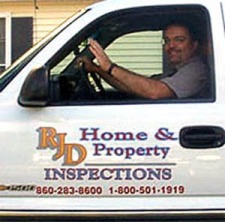As a consumer and home buyer you have the right to know exactly what a typical real estate (home) inspection is. The information presented here is intended give you a better understanding of exactly what your Home Inspector will and will not do for you during the course of an inspection.
First and foremost all inspectors in Ct MUST be licensed to perform a home inspection. In Ct there are two types of inspectors, licensed (HOI) and intern (HOP). Intern inspectors are working on a permit and are not yet licensed. RJD Home Inspections LLC (Bob Dattilo) is a licensed inspector, HOI 31. An inspection is a visual survey of those accessible areas that can be seen. No destructive testing or dismantling is done during the course of an inspection, hence an Inspector can only tell a client exactly what was in evidence at the time and date of the inspection. The inspector's eyes are not necessarily any better than the buyer's, except that the inspector is trained to look for specific tell-tale signs and clues that may lead to the discovery of actual or potential defects or deficiencies.
The Connecticut Standards Of Practice spell out specific areas in which the Inspector must identify various defects and deficiencies, as well as identifying the specific systems, components and items that are being inspected. There are many excluded areas noted in the Standards that the inspector does not have to report on. The inspector is not limited by the Standards and if the inspector wishes to include additional inspection/testing services (typically for an extra fee) then they may perform as many specific inspection/testing procedures as the client may request. Most inspectors will not give definitive cost estimates for repairs and replacements since the costs can vary greatly from one contractor to another. Inspectors typically will tell clients to secure three reliable quotes from those contractors performing the type of repairs in question.
Life expectancies are another area that most inspectors try not to get involved in. However, every system and component in a building will have a typical life expectancy, and these are discussed in RJD Home Inspection's report to you. Some items and units may well exceed those expected life spans, while others may fail much sooner than anticipated. An inspector may indicate to a client, general life expectancies, but should never give exact time spans for the above noted reasons. To do otherwise would be irresponsible of the inspector.
The average time for an inspection on a typical 3 bedroom house takes 3 to 4 hours. Inspections that take less than two hours typically are considered strictly cursory walk-through inspections and provide the client with less information than a full inspection.
All inspectors in Connecticut must provide clients with written reports. The following are some to the more common types:
1. Checklist with minimal comments
2. Rating System with minimal comments
3. Narrative report with a checklist or rating system
4. Pure Narrative reports
The best type of report is a combination of all systems, in which RJD Home Inspection LLC does. This best helps the reader fully understand the findings of the inspection. Any one reporting system is less than adequate. RJD Home Inspection LLC reports are computer generated, they have photos of the house, illustrated diagrams. Our reports are state of the art. We use the 3D Report Writing System. It is considered to be the best home inspection report on the market.
http://www.3dinspection.com



